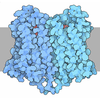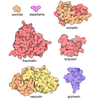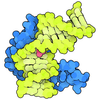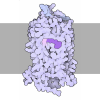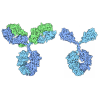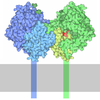[English] 日本語
 Yorodumi
Yorodumi- PDB-9m0d: Cryo-EM structure of neurotensin receptor 1 in complex with beta-... -
+ Open data
Open data
- Basic information
Basic information
| Entry | Database: PDB / ID: 9m0d | ||||||
|---|---|---|---|---|---|---|---|
| Title | Cryo-EM structure of neurotensin receptor 1 in complex with beta-arrestin 1 | ||||||
 Components Components |
| ||||||
 Keywords Keywords | MEMBRANE PROTEIN / GPCR / Neurotensin receptore 1 / Complex / beta-arrestin 1 / Phosphorylation | ||||||
| Function / homology |  Function and homology information Function and homology informationG protein-coupled neurotensin receptor activity / inositol phosphate catabolic process / symmetric synapse / angiotensin receptor binding / D-aspartate import across plasma membrane / positive regulation of gamma-aminobutyric acid secretion / TGFBR3 regulates TGF-beta signaling / Activation of SMO / regulation of membrane depolarization / positive regulation of arachidonate secretion ...G protein-coupled neurotensin receptor activity / inositol phosphate catabolic process / symmetric synapse / angiotensin receptor binding / D-aspartate import across plasma membrane / positive regulation of gamma-aminobutyric acid secretion / TGFBR3 regulates TGF-beta signaling / Activation of SMO / regulation of membrane depolarization / positive regulation of arachidonate secretion / L-glutamate import across plasma membrane / negative regulation of interleukin-8 production / regulation of respiratory gaseous exchange / positive regulation of inhibitory postsynaptic potential / arrestin family protein binding / negative regulation of systemic arterial blood pressure / G protein-coupled receptor internalization / negative regulation of release of sequestered calcium ion into cytosol / positive regulation of glutamate secretion / Lysosome Vesicle Biogenesis / temperature homeostasis / : / response to lipid / stress fiber assembly / positive regulation of cardiac muscle hypertrophy / positive regulation of inositol phosphate biosynthetic process / Golgi Associated Vesicle Biogenesis / positive regulation of Rho protein signal transduction / detection of temperature stimulus involved in sensory perception of pain / pseudopodium / negative regulation of interleukin-6 production / positive regulation of receptor internalization / negative regulation of Notch signaling pathway / neuropeptide signaling pathway / insulin-like growth factor receptor binding / clathrin-coated pit / negative regulation of protein ubiquitination / enzyme inhibitor activity / GTPase activator activity / Activated NOTCH1 Transmits Signal to the Nucleus / cytoplasmic vesicle membrane / Peptide ligand-binding receptors / positive regulation of release of sequestered calcium ion into cytosol / dendritic shaft / adult locomotory behavior / learning / Signaling by high-kinase activity BRAF mutants / electron transport chain / MAP2K and MAPK activation / G protein-coupled receptor binding / G protein-coupled receptor activity / cytoplasmic side of plasma membrane / terminal bouton / positive regulation of protein phosphorylation / Signaling by RAF1 mutants / Signaling by moderate kinase activity BRAF mutants / Paradoxical activation of RAF signaling by kinase inactive BRAF / Signaling downstream of RAS mutants / endocytic vesicle membrane / Signaling by BRAF and RAF1 fusions / Cargo recognition for clathrin-mediated endocytosis / protein transport / Clathrin-mediated endocytosis / Thrombin signalling through proteinase activated receptors (PARs) / cytoplasmic vesicle / ubiquitin-dependent protein catabolic process / G alpha (s) signalling events / perikaryon / dendritic spine / G alpha (q) signalling events / chemical synaptic transmission / molecular adaptor activity / proteasome-mediated ubiquitin-dependent protein catabolic process / transcription coactivator activity / electron transfer activity / periplasmic space / positive regulation of ERK1 and ERK2 cascade / Ub-specific processing proteases / nuclear body / protein ubiquitination / positive regulation of apoptotic process / membrane raft / iron ion binding / G protein-coupled receptor signaling pathway / Golgi membrane / lysosomal membrane / heme binding / ubiquitin protein ligase binding / positive regulation of gene expression / regulation of transcription by RNA polymerase II / negative regulation of apoptotic process / chromatin / protein-containing complex binding / cell surface / endoplasmic reticulum / Golgi apparatus / signal transduction / positive regulation of transcription by RNA polymerase II / nucleoplasm / identical protein binding Similarity search - Function | ||||||
| Biological species |   Homo sapiens (human) Homo sapiens (human) | ||||||
| Method | ELECTRON MICROSCOPY / single particle reconstruction / cryo EM / Resolution: 3.41 Å | ||||||
 Authors Authors | Sun, D.M. / Li, X. / Yuan, Q.N. / Tian, C.L. | ||||||
| Funding support | 1items
| ||||||
 Citation Citation |  Journal: Cell Res / Year: 2025 Journal: Cell Res / Year: 2025Title: Molecular mechanism of the arrestin-biased agonism of neurotensin receptor 1 by an intracellular allosteric modulator. Authors: Demeng Sun / Xiang Li / Qingning Yuan / Yuanxia Wang / Pan Shi / Huanhuan Zhang / Tao Wang / Wenjing Sun / Shenglong Ling / Yuanchun Liu / Jinglin Lai / Wenqin Xie / Wanchao Yin / Lei Liu / ...Authors: Demeng Sun / Xiang Li / Qingning Yuan / Yuanxia Wang / Pan Shi / Huanhuan Zhang / Tao Wang / Wenjing Sun / Shenglong Ling / Yuanchun Liu / Jinglin Lai / Wenqin Xie / Wanchao Yin / Lei Liu / H Eric Xu / Changlin Tian /  Abstract: Biased allosteric modulators (BAMs) of G protein-coupled receptors (GPCRs) have been at the forefront of drug discovery owing to their potential to selectively stimulate therapeutically relevant ...Biased allosteric modulators (BAMs) of G protein-coupled receptors (GPCRs) have been at the forefront of drug discovery owing to their potential to selectively stimulate therapeutically relevant signaling and avoid on-target side effects. Although structures of GPCRs in complex with G protein or GRK in a BAM-bound state have recently been resolved, revealing that BAM can induce biased signaling by directly modulating interactions between GPCRs and these two transducers, no BAM-bound GPCR-arrestin complex structure has yet been determined, limiting our understanding of the full pharmacological profile of BAMs. Herein, we developed a chemical protein synthesis strategy to generate neurotensin receptor 1 (NTSR1) with defined hexa-phosphorylation at its C-terminus and resolved high-resolution cryo-EM structures (2.65-2.88 Å) of NTSR1 in complex with both β-arrestin1 and the BAM SBI-553. These structures revealed a unique "loop engagement" configuration of β-arrestin1 coupling to NTSR1 in the presence of SBI-553, markedly different from the typical "core engagement" configuration observed in the absence of BAMs. This configuration is characterized by the engagement of the intracellular loop 3 of NTSR1 with a cavity in the central crest of β-arrestin1, representing a previously unobserved, arrestin-selective conformation of GPCR. Our findings fill the critical knowledge gap regarding the regulation of GPCR-arrestin interactions and biased signaling by BAMs, which would advance the development of safer and more efficacious GPCR-targeted therapeutics. | ||||||
| History |
|
- Structure visualization
Structure visualization
| Structure viewer | Molecule:  Molmil Molmil Jmol/JSmol Jmol/JSmol |
|---|
- Downloads & links
Downloads & links
- Download
Download
| PDBx/mmCIF format |  9m0d.cif.gz 9m0d.cif.gz | 199.5 KB | Display |  PDBx/mmCIF format PDBx/mmCIF format |
|---|---|---|---|---|
| PDB format |  pdb9m0d.ent.gz pdb9m0d.ent.gz | Display |  PDB format PDB format | |
| PDBx/mmJSON format |  9m0d.json.gz 9m0d.json.gz | Tree view |  PDBx/mmJSON format PDBx/mmJSON format | |
| Others |  Other downloads Other downloads |
-Validation report
| Arichive directory |  https://data.pdbj.org/pub/pdb/validation_reports/m0/9m0d https://data.pdbj.org/pub/pdb/validation_reports/m0/9m0d ftp://data.pdbj.org/pub/pdb/validation_reports/m0/9m0d ftp://data.pdbj.org/pub/pdb/validation_reports/m0/9m0d | HTTPS FTP |
|---|
-Related structure data
| Related structure data |  63543MC 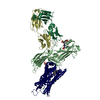 8zytC 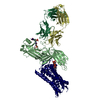 8zyuC 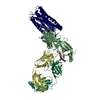 8zyyC C: citing same article ( M: map data used to model this data |
|---|---|
| Similar structure data | Similarity search - Function & homology  F&H Search F&H Search |
- Links
Links
- Assembly
Assembly
| Deposited unit | 
|
|---|---|
| 1 |
|
- Components
Components
| #1: Protein | Mass: 62097.848 Da / Num. of mol.: 1 Source method: isolated from a genetically manipulated source Source: (gene. exp.)   Homo sapiens (human) Homo sapiens (human)Gene: cybC, NTSR1, NTRR Production host: Mammalian expression vector Flag-MCS-pcDNA3.1 (others) References: UniProt: P0ABE7, UniProt: P30989 |
|---|---|
| #2: Protein | Mass: 45224.598 Da / Num. of mol.: 1 Source method: isolated from a genetically manipulated source Source: (gene. exp.)  Homo sapiens (human) / Gene: ARRB1, ARR1 Homo sapiens (human) / Gene: ARRB1, ARR1Production host:  References: UniProt: P49407 |
| #3: Antibody | Mass: 27727.010 Da / Num. of mol.: 1 Source method: isolated from a genetically manipulated source Source: (gene. exp.)  Homo sapiens (human) / Production host: Homo sapiens (human) / Production host:  |
| #4: Antibody | Mass: 25422.467 Da / Num. of mol.: 1 Source method: isolated from a genetically manipulated source Source: (gene. exp.)  Homo sapiens (human) / Production host: Homo sapiens (human) / Production host:  |
| Has ligand of interest | Y |
| Has protein modification | Y |
-Experimental details
-Experiment
| Experiment | Method: ELECTRON MICROSCOPY |
|---|---|
| EM experiment | Aggregation state: PARTICLE / 3D reconstruction method: single particle reconstruction |
- Sample preparation
Sample preparation
| Component | Name: Ternary complex of neurotensin receptor 1 with beta-arrestin 1 and Fab30 Type: COMPLEX / Entity ID: all / Source: RECOMBINANT |
|---|---|
| Molecular weight | Experimental value: NO |
| Source (natural) | Organism:  Homo sapiens (human) Homo sapiens (human) |
| Source (recombinant) | Organism: Mammalian expression vector Flag-MCS-pcDNA3.1 (others) |
| Buffer solution | pH: 7.4 |
| Specimen | Embedding applied: NO / Shadowing applied: NO / Staining applied: NO / Vitrification applied: YES |
| Vitrification | Cryogen name: ETHANE |
- Electron microscopy imaging
Electron microscopy imaging
| Experimental equipment | 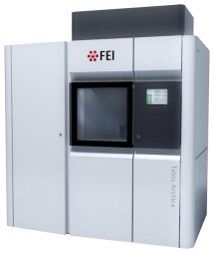 Model: Talos Arctica / Image courtesy: FEI Company |
|---|---|
| Microscopy | Model: FEI TECNAI ARCTICA |
| Electron gun | Electron source:  FIELD EMISSION GUN / Accelerating voltage: 300 kV / Illumination mode: FLOOD BEAM FIELD EMISSION GUN / Accelerating voltage: 300 kV / Illumination mode: FLOOD BEAM |
| Electron lens | Mode: BRIGHT FIELD / Nominal defocus max: 2000 nm / Nominal defocus min: 800 nm |
| Image recording | Electron dose: 50 e/Å2 / Film or detector model: GATAN K3 BIOQUANTUM (6k x 4k) |
- Processing
Processing
| EM software | Name: PHENIX / Version: 1.20.1_4487 / Category: model refinement | ||||||||||||||||||||||||
|---|---|---|---|---|---|---|---|---|---|---|---|---|---|---|---|---|---|---|---|---|---|---|---|---|---|
| CTF correction | Type: PHASE FLIPPING AND AMPLITUDE CORRECTION | ||||||||||||||||||||||||
| 3D reconstruction | Resolution: 3.41 Å / Resolution method: FSC 0.143 CUT-OFF / Num. of particles: 6359592 / Symmetry type: POINT | ||||||||||||||||||||||||
| Refinement | Highest resolution: 3.41 Å Stereochemistry target values: REAL-SPACE (WEIGHTED MAP SUM AT ATOM CENTERS) | ||||||||||||||||||||||||
| Refine LS restraints |
|
 Movie
Movie Controller
Controller





 PDBj
PDBj
